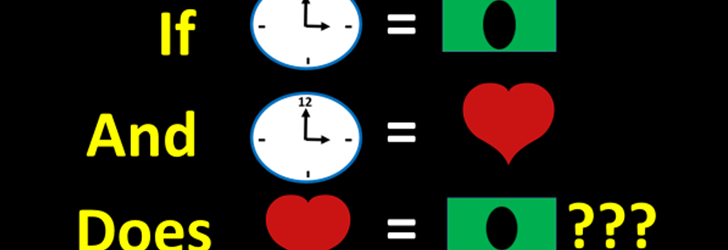I have never really questioned the saying, time is money until I started hearing time compared to other things, such as “time is love” by Josh Turner. If time is money and time is love, this will lead us to reason that love is money. Now I’m not saying that Josh Turner was implying that love is money, a song title of Love is Money probably needing to be moved to another genre of music to be successful, but why doesn’t this reasoning work?
How is it that time equaling money rings true but love equaling money does not?
The first step to this kind of problem is to drill down on some definitions, definitions often being something we take for granted, something we believe is fully understood until asked to define a term fully. For example, asking a professor of physics to define time may result in a very long response leaving us with more questions about time than answers, asking an economist to define money may result in a detailed discussion about what the traits of money are, and asking a poet to define love may result a few hours of poetry to illustrate the non-explainable. An attempt to define these terms, however, is where we will start.
What exactly are money, love, and time?
According to Merriam-Webster money, love, and time can be defined as:
- Money is something generally accepted as a medium of exchange, a measure of value, or means of payment.
- Love is a strong affection for another arising out of kinship or personal ties.
- Time is the measure or measurable period during which an action, process, or conditions exists or continues.
When asked why time equals money many of us would respond that both have value and are therefore at least similar, if not the same. Money is a measure of value according to our definition of money and time is a measurable period. The link between time and money may actually be that we need the concept of time to measure performance and money is a standard unit of measure. In other words, we cannot measure something like revenue without the concepts of time and some unit of measure, like money, because revenue is a measure over time.
When asked why money does not equal love, money not equaling love being a response I’m assuming most would give, many of us would respond that there is something about the concept of love that cannot be measured in the units of dollars. Maybe part of the reason for this is that there is not the same connection between love and time as there is between money and time, love not being something that can be accumulated over time in the same way that revenue can. In other words, it is difficult to measure performance over time using love as the unit of measure, although we do try and do this. For example, when analyzing somebody’s life, we may ask the question of whether she was well-loved as part of our analysis, part of our measure of her life.
From an economic perspective, love would not work well as money because, although love can be thought of as storing value, love, defined as a strong affection, is not a good medium of exchange, strong affection not being something we can trade for a loaf of bread.
In conclusion, although there are links between time, money, and love:
Time ≠ love ≠ money
but
Time = Money & Time = Love
may be useful phrases in normal conversation as long as we are careful to avoid insinuating the logical conclusion that of these statements, that
Love = Money
to avoid the conversation taking an unintended turn.

